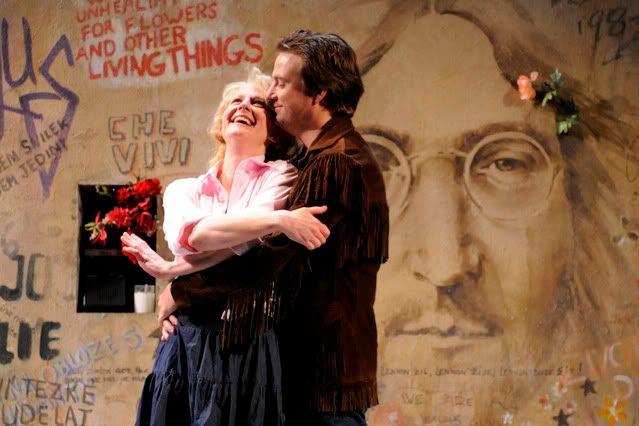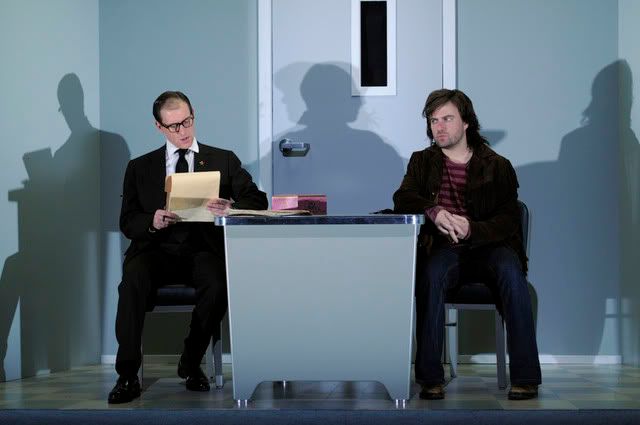Opened Sept. 17, 2008

Rene Augesen is Esme and Manoel Felciano is Jan in a scene set at Prague’s John Lennon wall in the American Conservatory Theater production of Rock ‘n’ Roll by Tom Stoppard. Photos by Kevin Berne
ACT gives Stoppard’s heavy `Rock’ a mighty roll
«««1/2
Rock ‘n’ Roll has a beat – a heartbeat.
Tom Stoppard’s play, the season –opener for San Francisco’s American Conservatory Theater, bears all the playwright’s hallmarks: weighty intellect, deep sense of history, dry wit, thick dramaturgy. But all of that is less important here than the powerful emotions coursing through the characters’ complicated lives – the emotions and the words.
This is Stoppard’s most autobiographical play. Like his protagonist, Jan, Stoppard is Czechoslovakian by birth and spent an important chunk of his childhood in England. This duality gives Stoppard, and Jan, a dual perspective, not to mention another language, through which to view the crumbling of Communism.
Perhaps Stoppard’s intimate relationship with the history involved here combined with his passion for rock music help the play wage a battle between the heart and the intellect that lets the heart ultimately rule.
Director Carey Perloff, who usually does her best work with Stoppard, doesn’t disappoint. Her production has focus and momentum, and her cast navigates well the tricky balance between the ideology and the humanity.
This is a play that dramatizes Czech politics, from “Prague Spring” in 1968 to the post-Communist world of perestroika in the late ’80s. Unless you’re a historian, you likely don’t know a whole lot about this place or this period beyond what you remember from watching (or reading) “The Unbearable Lightness of Being.”
And while Stoppard requires his audience to be on its collective toes and pay close attention, the genius of the play is that underneath all the heated discussions about this regime, that petition, these arrests or the pros and cons of socialism, Stoppard allows life and emotions to propel the play.
This notion is embodied in – what else? – rock ‘n’ roll music. Jan (Manoel Felciano) is a rock devotee. When the Czech police want to destroy his spirit they know exactly what to smash: his LP collection full of the Doors, Beach Boys, Rolling Stones and Pink Floyd’s Syd Barrett (a central, ethereal figure in the play).
Jake Rodriguez’s sound design is like a character in the play – the music is passion, connection and, in its way, revolution. The Czech rock band Plastic People of the Universe (who are, coincidentally, playing Slim’s on Oct. 9) figure prominently in the play as comrades of Jan’s whom he admires musically and politically – he even ends up in jail with them after one of their subversive events (a wedding if I heard correctly).
A Rolling Stones concert becomes a testament to a changed world, and Barrett’s “Golden Hair” (itself based on a James Joyce poem) becomes a family’s musical touchstone.

Felciano (above right with Anthony Fusco as a Czech interrogator) as Jan carries much of the play’s emotional weight and does so beautifully. He ages more than 20 years in a believable, low-key way that takes him from the optimism of youth powered by a mighty mind to the realities of a police state and prison to a more subdued middle age where people matter more than politics.
ACT core company member Rene Augesen has one unforgettable scene in Act 1 as Eleanor, a cancer-ridden Cambridge professor giving Sappho tutorials on her back porch. Decimated by not defeated by her illness delivers a ferocious diatribe against words over meaning. She has just watched her student (Delia MacDougall as Lenka) flirt shamelessly with her Communist husband, Max (Jack Willis), during the lesson.
The word at issue is “mind.” Her husband has highbrow definitions of what the mind is – he says it’s a machine that could be made of beer cans — and she’ll have none of it: “Don’t you dare reclaim that word now,” she says. “I don’t want your `mind’ which you can make out of beer cans. Don’t bring it to my funeral. I want your grieving soul or nothing. I do not want your amazing biological machine – I want what you love me with.”
Augesen is extraordinary – not relying on any of the usual tricks we’ve come to see in her work over the years (those come in Act 2 when she plays Eleanor’s daughter, Esme) – she’s so real and vital and frail you almost feel the need to comfort her.
Words and truth are important and elusive in Rock ‘n’ Roll. How can so many words, so many shifting words, ever arrive at the truth?
Discussing words, Jan tells Max: “A thousand years of knowing who you are gives a people confidence in its judgment. Words mean what they have always meant. With us, words change meaning to make the theory fit the practice.”
The fascinating, compelling blend of words and music – intellect and spirit – fuels the play and makes it stand apart from Stoppard’s oeuvre. It’s a lifetime of experience in a complex, heartbreaking, spirit-crushing world that comes to no easy answer beyond giving yourself over to music you love.
That this trajectory comes through so clearly is a testament to the play itself and to Perloff’s handsome production. Douglas W. Schmidt’s set inspires a feeling of vertigo. Inspired by a photograph by Agata Jablonska, the set conveys a sense of standing amid dense buildings and looking up to the sky – oppression and release.
Aside from some accent issues (they come, they go), the cast is strong. Willis has fire but seems miscast as Max, the Cambridge professor for whom arguing is like breathing. But that’s the only major misstep, and strong supporting turns come from Jud Williford as Jan’s compatriot, Ferdinand, and Summer Serafin as Alice, an ‘80s teen with a restless mind and a big heart.
At nearly three hours, Rock ‘n’ Roll is overwhelming in the best sense. We’re pulled into a world – our world – and made to care. More importantly we’re made to listen. And think. And care.
FOR MORE INFORMATION
Rock ‘n’ Roll continues an extended run through Oct. 18 at the American Conservatory Theater, 415 Geary St., San Francisco. Tickets are $20-$82. Call 415-749-2228 or visit www.act-sf.org.
